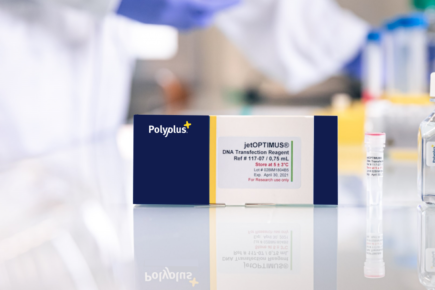jetOPTIMUS® is an innovative cationic nanotechnology developed to improve DNA transfection efficiency in hard-to-transfect cells.

Plasmids are small circular DNA molecules that are commonly found in bacteria. They exist and replicate separately from chromosomal DNA and in bacteria they often carry genes that are beneficial for bacterial survival. Plasmids can be deliberately introduced into desired cells and utilized to overexpress a gene of interest in a specific cell line. This procedure is called DNA transfection and is a commonly used method for studying gene function or protein of interest.
By performing a process of DNA transfection, a plasmid which contains a gene of interest is efficiently delivered to the cells of interest. Upon delivery to the cells plasmid DNA reaches the nucleus during cell division, the gene of interest is transcribed and its transient expression is achieved. Some of the main goals when performing DNA transfection is achieving good transfection efficiency while keeping good cell viability, which is rather difficult with lipid based reagents.
In mammalian cells, RNA interference can be achieved by means other than with synthetic siRNA. Another silencing approach consists in using plasmid-based methods. Efficient gene silencing can be obtained with small hairpin RNA (shRNA) plasmids as well as micro RNA (miRNA) plasmids, although miRNAs can also be used to stimulate gene expression.
jetOPTIMUS® is a polymer-based reagent recommended for delivery of any kind of plasmid DNA to various adherent cell lines in presence of serum in everyday transfections. For DNA delivery in High Throughput Screening applications, we recommend using jetPEI® reagent.
We have developed several cell-specific reagent perfectly suitable for DNA transfection of primary cells. Thus, jetPEI®-Macrophage is recommended for transfection of primary macrophages, glial & dendritic cells; jetPEI®-Hepatocyte is specifically adapted for transfection of primary hepatocytes.
If the goal of DNA transfection is to produce large quantities of protein or viruses by performing Transient Gene Expression (TGE), FectoPRO® and PEIpro® are our best suited reagents for these applications. For the in vivo delivery of plasmids our best suited reagent is in vivo-jetPEI®.